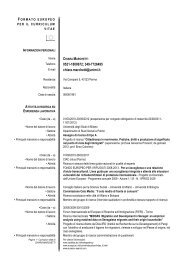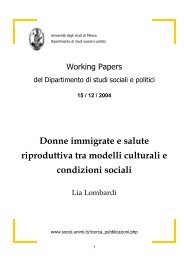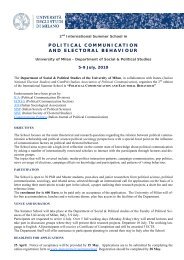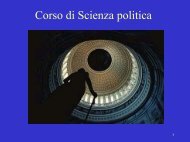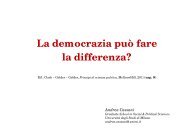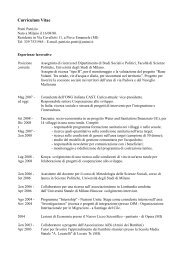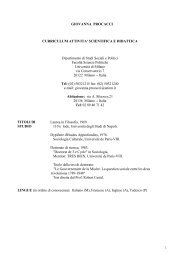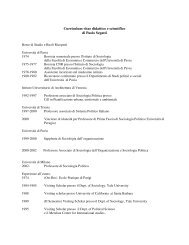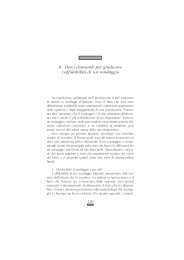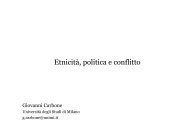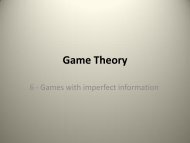The european dimension of political discourse in Italy. A ... - CIRCaP
The european dimension of political discourse in Italy. A ... - CIRCaP
The european dimension of political discourse in Italy. A ... - CIRCaP
Create successful ePaper yourself
Turn your PDF publications into a flip-book with our unique Google optimized e-Paper software.
THE EUROPEAN DIMENSION OF POLITICAL DISCOURSE IN ITALY.<br />
5. New party elites between cultural legacies and a grow<strong>in</strong>g need to talk about Europe:<br />
f<strong>in</strong>d<strong>in</strong>gs and suggestions<br />
We will try now to summarize the most important f<strong>in</strong>d<strong>in</strong>gs we have put <strong>in</strong>to evidence so far.<br />
Some <strong>of</strong> the arguments from historical analyses <strong>of</strong> party attitudes towards European<br />
<strong>in</strong>tegration have been confirmed by our <strong>in</strong>-depth analysis <strong>of</strong> electoral programmes and party<br />
<strong>in</strong>ternal debates. Italian parties have traditionally faced a remarkable difficulty <strong>in</strong> form<strong>in</strong>g a<br />
real “<strong>discourse</strong>” about European <strong>in</strong>tegration but, on the other hand, each <strong>of</strong> them used, <strong>in</strong><br />
turn, this issue to strengthen their role or legitimate themselves <strong>in</strong> front <strong>of</strong> the voters. <strong>The</strong><br />
evolution <strong>of</strong> the <strong>discourse</strong> seems to be <strong>in</strong>fluenced by a number <strong>of</strong> “domestic” <strong>political</strong><br />
conditions: first, the strategic goals <strong>of</strong> each party <strong>in</strong> the different cycles <strong>of</strong> coalition<br />
governance (figure 4), which motivate the shifts <strong>of</strong> the left parties, but also the m<strong>in</strong>or<br />
corrections <strong>in</strong> the attitudes <strong>of</strong> the Christian democracy; secondly, the need to dist<strong>in</strong>guish an<br />
“<strong>in</strong>ternal <strong>discourse</strong>”, oriented to keep the activists close to the ideological guidel<strong>in</strong>es <strong>of</strong> the<br />
party elite, and a “communicative <strong>discourse</strong>” oriented to meet the demand <strong>of</strong> an <strong>in</strong>creas<strong>in</strong>gly<br />
pro-European public op<strong>in</strong>ion.<br />
<strong>The</strong> data we have collected also allow us to address the problem <strong>of</strong> the discont<strong>in</strong>uity <strong>in</strong> the<br />
attitudes over time. <strong>The</strong> changes before 1992 have followed a logic <strong>of</strong> strategic (or<br />
ideological) re-position<strong>in</strong>g ma<strong>in</strong>ly controlled by party elites, but without impact<strong>in</strong>g very much<br />
on the rather limited salience <strong>of</strong> European Integration <strong>in</strong> the communicative <strong>discourse</strong>. This<br />
picture can fit some broader <strong>in</strong>terpretative frameworks like the one on the embedd<strong>in</strong>g <strong>of</strong> the<br />
electoral competition <strong>in</strong> the domestic problems traditionally characteris<strong>in</strong>g <strong>Italy</strong> (Mastropaolo<br />
and Slater 1987) and the one on the <strong>in</strong>creas<strong>in</strong>g <strong>in</strong>ability <strong>of</strong> government parties to develop a<br />
comprehensive list <strong>of</strong> <strong>political</strong> guidel<strong>in</strong>es (Cotta and Isernia 1996). Also the decisive<br />
“conversion” <strong>of</strong> Pci to the pro-European side looks more like the necessary adaptation <strong>of</strong> the<br />
elite attitudes to new strategic goals, than a dramatic change <strong>in</strong> the “<strong>in</strong>ternal” elite’s<br />
<strong>discourse</strong>.<br />
<strong>The</strong> impact <strong>of</strong> the external and <strong>in</strong>tra-party constra<strong>in</strong>ts <strong>in</strong> the formation <strong>of</strong> “<strong>of</strong>ficial” positions on<br />
European Integration is a critical factor dur<strong>in</strong>g the first republic. Especially with<strong>in</strong> the Dc (but<br />
also among the socialists) the shap<strong>in</strong>g <strong>of</strong> party preferences on European <strong>in</strong>tegration was not<br />
always a pa<strong>in</strong>less process, and sometimes it proved rather problematic, lead<strong>in</strong>g to <strong>in</strong>tra-party<br />
tensions. In any case, the complicated elite structures <strong>in</strong> these two parties did not encourage<br />
their leaders to promote a more articulate and bold <strong>discourse</strong> about these issues, limit<strong>in</strong>g the<br />
relevant content to a “celebration” <strong>of</strong> Europe, without <strong>in</strong>troduc<strong>in</strong>g more accurate arguments<br />
about the costs and the benefits <strong>of</strong> <strong>in</strong>tegration.<br />
39



